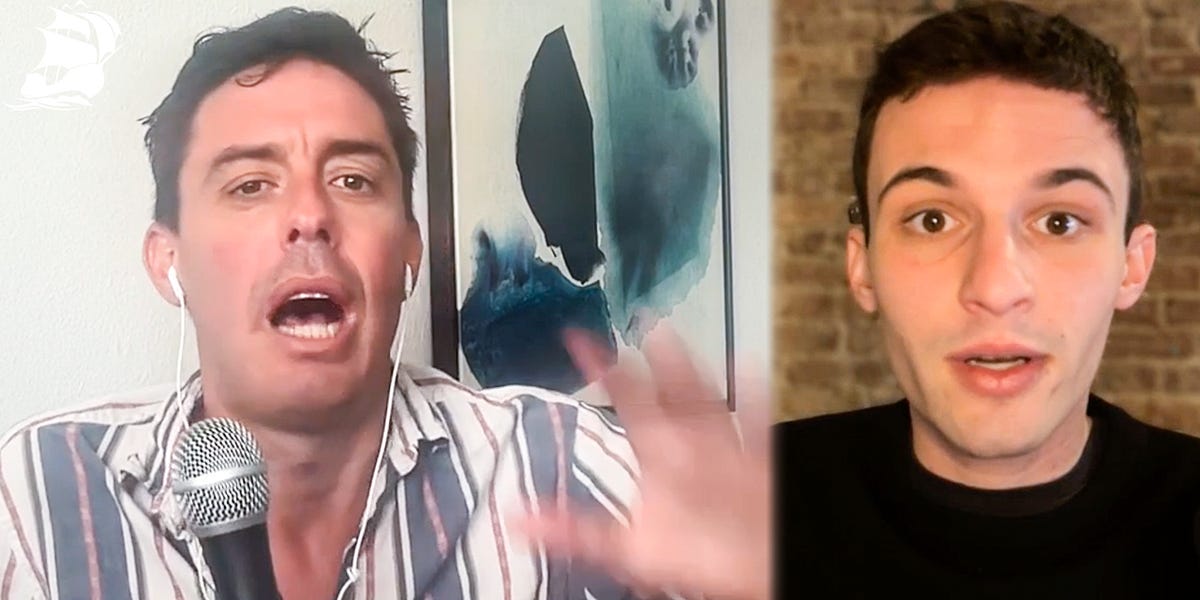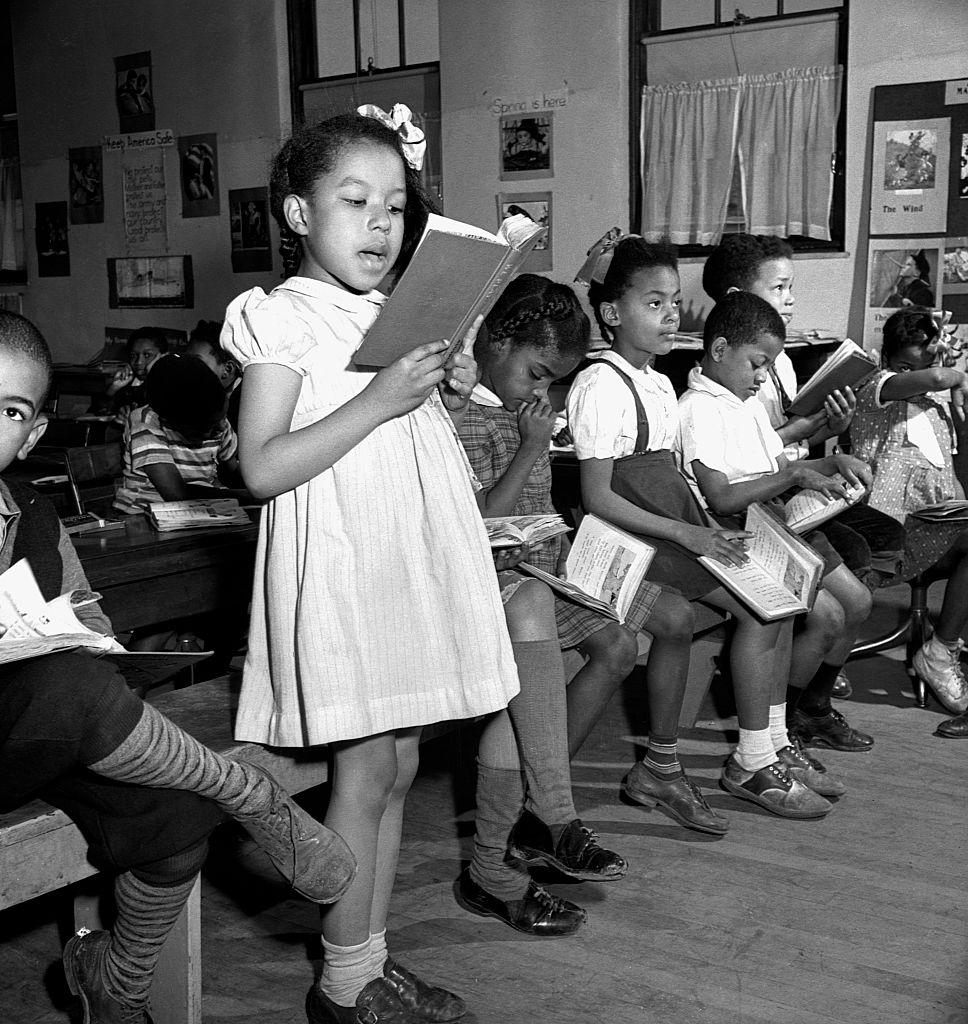
Trump Wants to End Head Start While Boosting Military Spending to Record $1 Trillion | Common Dreams
April 14, 2025
Earthquake Tries to Kill Tim Miller!
April 14, 2025As Trump moves to dismantle the Department of Education, echoes of Jim Crow remind us what happens when states are left to decide who deserves an education—and who doesn’t.
On March 20, 2025, President Donald Trump gutted the Department of Education with the stroke of a pen, signing an executive order that marked the beginning of the end for federal public education as we know it. The American school system, a public good, will soon become private.
If you want to know what privatizing essential rights looks like, look at the U.S. healthcare system.
In America, quality care is reserved for those who can afford it, while everyone else faces instability, uncertainty and debt. Now, this same market-driven logic is about to be applied to our education system.
After a wave of chaotic executive orders from Trump, and sweeping federal closures, freezes and layoffs by Elon Musk’s Department of Government Efficiency (DOGE), the Department of Education is now on the chopping block. They package it as a return to “states’ rights” and an expansion of parental “school choice.”
But every parent, educator and student in America should be asking: “States’ rights to do what? And to whom?”
We have seen this before.
Programs like Social Security, Medicaid, Medicare and the GI Bill exist because certain rights are too fundamental to be left to the whims of individual states or marketplaces. Education is one of them.
In the aftermath of the Civil War, the federal government created the Bureau of Refugees, Freedmen and Abandoned Lands (the Freedmen’s Bureau). This agency was charged with providing much needed support to America’s 4 million newly freed citizens, who, during slavery, had been systematically denied citizenship and personhood. After centuries of state-sanctioned bondage, it seemed reasonable to Congress to provide support for African Americans’ transition to citizenship.
The Bureau did a lot. It reunited families torn apart by slavery, established the Freedmen’s Bank to help African Americans save and borrow money, and helped negotiate labor contracts between Black workers and white business owners. Its most lasting impact, however, was catalyzing the Black education system.
It is often forgotten that before the Civil War, the South had no public school system at all—for white or Black children. It was African Americans, who had been legally forbidden from learning to read and write, who were at the forefront of pushing for public education as a right for all citizens. They understood all too well that education was freedom. And it wasn’t just the Freedmen’s Bureau setting up schools. Black religious institutions, like the African Methodist Episcopal Church, established thousands of schools to educate their communities. Between 1865 and 1870, the Freedman’s Bureau built nearly 5,000 Black schools in the South.
In this way, the Freedmen’s Bureau was one of America’s first federal social safety agencies.

Our federal government creates such agencies and programs to ensure a national standard of living. Programs like Social Security, Medicaid, Medicare and the GI Bill exist because certain rights are too fundamental to be left to the whims of individual states or marketplaces. Education is one of them. These programs define what it means to be an American citizen. Without federal oversight, these rights become privileges, distributed unequally based on wealth, politics or one’s zip code.
But the federal commitment to providing relief to African Americans didn’t last. In 1872, just seven years after emancipation, Congress dismantled the Freedman’s Bureau.
Fast forward five years, President Rutherford B. Hayes struck a backroom deal to end the Reconstruction Era altogether, all in the name of “states’ rights.” With that so-called 1877 Compromise, federal troops withdrew from the South, leaving African Americans under the rule of the very states that had once enslaved them. Freed from federal oversight, Southern states codified vicious Jim Crow laws and relegated Black citizens to second-class status for nearly a century. These laws built an entire system of legal exclusion, stripping Black people of their rights and even criminalizing their efforts to advocate for themselves. Black officials were purged from elected office. Their voting rights were stripped away. Black communities were abandoned in the cruelest ways.
And state governments, newly “liberated” under states’ rights, made one thing clear: They would not fund Black education.
The federal government had abandoned its most vulnerable citizens.
The schools founded by the Freedmen’s Bureau after the Civil War were left to fend for themselves. Southern states refused to fund Black schools, even as they poured resources into white public schools. Disparities in public spending was staggering. In some counties, white children received over 10 times more in school funding than Black children—$22 per white child compared to less than $2 per Black child. That deliberate underdevelopment meant that Black schools were systematically underfunded, overcrowded and left to wither at the vine while white public schools flourished. As a result, Black education became widely privatized—not by choice, but by necessity.
This is where America’s first billionaires—figures like the Rockefellers and the Carnegies—stepped in. Through newly founded philanthropic organizations, they funneled money into Black education, but always with thick strings attached. In return for their donations, white northern philanthropies and white southern elites dictated what Black children were allowed to learn. They championed industrial education—a curriculum designed to produce manual laborers. This curriculum intended to train Black students to serve, not think; to toil, not challenge. This was education as social control, preparing the next generation of Black Americans to be cogs in a capitalist machine. Jim Crow laws stayed on the books for nearly a century, institutionalizing a separate an unequal apartheid education system for Black and white students.
I know this history intimately—not just from my research as a sociologist or from my recent book, The Battle for the Black Mind, but because this history runs deep in my own family. My parents attended segregated schools in Lynch, Ky., intentionally deprived of resources, designed to ensure inequality under the guise of “separate but equal.” They belonged to the generation of Black youth who courageously desegregated American schools. And I am among the first generation in my family who attended schools based solely on my ability—not my race or residency.
I’m writing this because the warning signs are clear: What happened to my parents under Jim Crow could easily happen again today.
And now, the boomerang of “states’ rights” is coming for all Americans.
This is how the ‘states’ rights’ playbook works: First, defund in order to create a crisis. Then, present privatization as the only way forward.
Under Project 2025, which the Trump administration has been carrying out to the letter, the end game is clear. Their plan to abolish the Department of Education is underway, which includes eliminating federal funding for public schools and transitioning to the mass privatization of American education. States will decide which schools deserve support and which don’t.
This will not come down to merit, but to marketplace: The wealthiest schools, the ones with the most vocal and politically connected school boards, will be the ones to secure the lions’ share of resources. Meanwhile the underfunded schools—especially those serving Black, brown, low-income and disabled students—will be deemed undeserving and left to collapse.
This is how the “states’ rights” playbook works: First, defund in order to create a crisis. Then, present privatization as the only way forward.
This effort is cloaked in the seductive rhetoric of “parental rights” and “school choice.” The same playbook that gutted pensions in favor of risk 401(k)s in the 1980s and 90s is now being applied to education. Parents and students will be left to fend for themselves in an unstable, unregulated market where access to quality schooling will be a privilege, not a right.
Privatizing education does not expand choice. It commodifies our children’s futures.
This is not a distant threat. Dismantling federal protections won’t just affect poor neighborhoods or underfunded schools. It will reshape the educational landscape for everyone. Without federal oversight, states will have the power to slash services for students with special needs and learning disabilities. Families who rely on Individualized Education Plans (IEPs) could find those protections gone overnight.
In a fully privatized system, access to a good education will hinge on parents’ ability to navigate a competitive and unforgiving marketplace. Good schools could suddenly close if they’re deemed “unprofitable,” leaving American families scrambling to find alternatives. Communities that are supportive, but not wealthy enough to attract high-quality privatized schools will see their children abandoned.
Public education is not designed to just serve “deserving” individuals. It is designed to serve the collective good, and our democracy. Once public its gone, it won’t be just poor kids, Black kids or kids with disabilities who suffer. It will be all of us.
We have seen this mad dash to “states rights” before. The question is, will we the people sit back and let it happen again?
Ms. Classroom wants to hear from educators and students being impacted by legislation attacking public education, higher education, gender, race and sexuality studies, activism and social justice in education, and diversity, equity and inclusion programs for our series, ‘Banned! Voices from the Classroom.’ Submit pitches and/or op-eds and reflections (between 500-800 words) to Ms. contributing editor Aviva Dove-Viebahn at adove-viebahn@msmagazine.com. Posts will be accepted on a rolling basis.
Great Job Karida Brown & the Team @ Ms. Magazine Source link for sharing this story.





